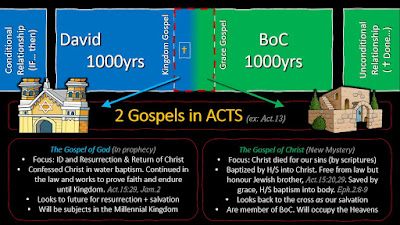Q-A: Did Paul commit the unforgivable sin?
Q-A: Did Paul commit the unforgivable sin?

Before we can answer this question, lets review the scripture passage that mentions the unforgivable sin. We find it in Matthew's gospel where Jesus is speaking,
Matthew 12:30 He who is not with Me is against Me, and he who does not gather with Me scatters abroad. 31 "Therefore I say to you, every sin and blasphemy will be forgiven men, but the blasphemy against the Spirit will not be forgiven men. 32 Anyone who speaks a word against the Son of Man, it will be forgiven him; but whoever speaks against the Holy Spirit, it will not be forgiven him, either in this age or in the age to come.
In order to get a better understanding on what Jesus meant in this passage, I recommend to first read "What is the unforgivable sin?" and then return here to complete the rest of this article.
As mentioned in the above referenced article, the unforgivable sin was the rejection of the Holy Spirit and His work and purpose by the nation of Israel. During the period, when God's Holy Spirit was being poured out at Pentecost, it was the end of grace for each unbelieving Jew, and the Jewish nation as a whole. The prophecies of Jer.31:31-34 and Ezek.36:25-28 would be put on hold and the program of law and the purpose of Israel would be suspended till the end of the Tribulation.(Isa.66:8)
As mentioned in the above referenced article, the unforgivable sin was the rejection of the Holy Spirit and His work and purpose by the nation of Israel. During the period, when God's Holy Spirit was being poured out at Pentecost, it was the end of grace for each unbelieving Jew, and the Jewish nation as a whole. The prophecies of Jer.31:31-34 and Ezek.36:25-28 would be put on hold and the program of law and the purpose of Israel would be suspended till the end of the Tribulation.(Isa.66:8)
So, having expounded on the unforgivable sin, one can now understand the position that Saul held in this regard. Saul put his rejection of the Holy Spirit into action when he held the cloaks of the men who stoned Stephan. Saul went on to be the most fervent of Jews in his attempts to stamp out the Jews who believed in Jesus as the Christ, the Messiah. Saul had committed the unforgivable sin of blasphemy to the Holy Spirit.
But wait a moment! How can this be? Didn't Saul become Paul? And wasn't Paul the one who became the Apostle to the church, the body of Christ? How did Paul escape this verdict? Well, friends, that is all contained in the amazing miracle we'll get into now in the rest of this article.
God is no man that He should lie. In order for God to save Saul, He could not go against His Word. There was no way that Saul could be forgiven in the current program in which he lived. The law program was in full swing and Paul was as guilty as they come! But our God is great, our God is sovereign and our God is just and full of wisdom. God would use Saul as the instrument to start a whole NEW program, and you guessed it, God would save Saul as the first person into this new dispensation of grace. Paul, as the first member into this grace age could now receive mercy under the program that was not bound by the laws of the former. God saved Paul without going against His own Word. Wow! You must agree with me that this is one incredible miracle and one incredible scenario of grace!
Have a look at this verse that confirms clearly what I've just written about. Paul writes to Timothy and says,
1 Timothy 1:15 This is a faithful saying and worthy of all acceptance, that Christ Jesus came into the world to save sinners, of whom I am chief.
Can you see why Paul says he is chief of the sinners! Paul knew what he was, what he had done, and what God had done for Him!
Paul continues writing to Timothy,
1 Timothy 1:16 However, for this reason I obtained mercy, that in me first Jesus Christ might show all longsuffering, as a pattern to those who are going to believe on Him for everlasting life.
This is also why Paul can write other incredible statements in his epistles, two of which I'm itching to give you now for reference to what I mean. Read the following,
1 Cor.3:10 According to the grace of God which is given unto me, as a wise masterbuilder, I have laid the foundation, and another buildeth thereon. But let every man take heed how he buildeth thereupon.
How can Paul say, "I am the masterbuilder" and "I have laid the foundation"? Consider who came before Paul. Didn't Jesus himself build up the Kingdom and lay a covenantal foundation? Well, certainly, but that was for the Jews under law. Paul is the first into the grace program and the apostle to whom the glorified and risen Christ revealed the secrets of the grace doctrine. It is Paul who laid the foundation with these mysteries (Rom.16:25).
Consider one more of Paul's interesting statements,
1 Cor.4:15 For though ye have ten thousand instructers in Christ, yet have ye not many fathers: for in Christ Jesus I have begotten you through the gospel.
Did you get that? Paul has just said that he has begotten us (birthed us) through the gospel [of grace]. Because Paul is the first to proclaim this grace gospel and by the power of God within the message of this gospel, all who come to salvation through this gospel have been begotten under his ministry. As the Jews are the physical seed of Abraham. so we are the spiritual seed of Abraham through Paul. Wow!
In summary, Saul did commit the unforgivable sin and in the law dispensation he would always be found guilty, but in Gods wisdom and grace, He started a new dispensation through Paul and saved and acquitted him in this new program in which the law could not accuse him. God had a plan for Paul and made him the first in a new pattern that would proclaim God's grace for all who followed. Amen!



Comments
Post a Comment